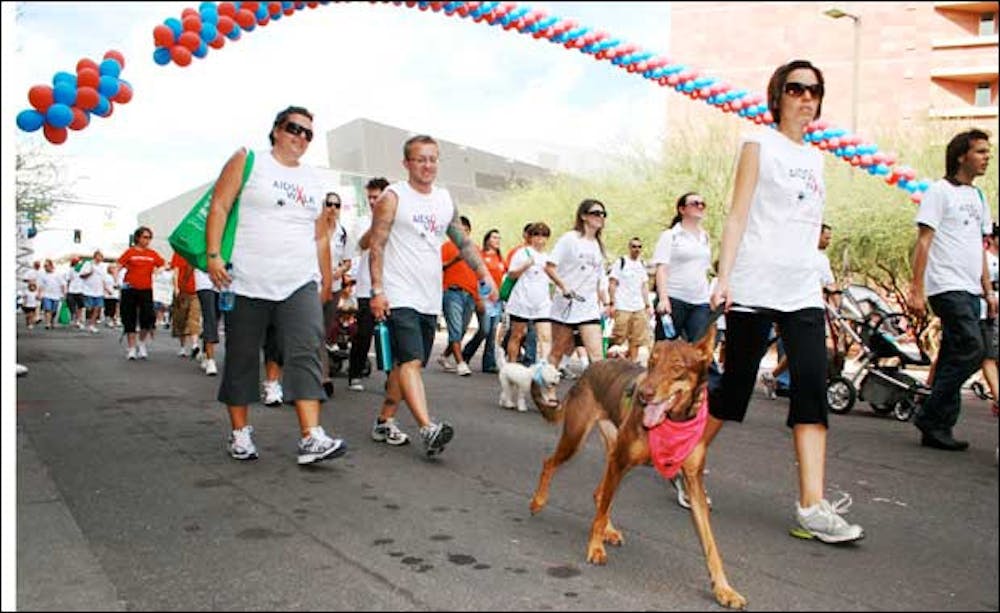AIDS Walk 2009 brought more than 2,000 participants to downtown Phoenix Sunday morning, including about 175 people who walked with teams from ASU.
Participants at the walk, which serves to raise public awareness and advocacy for HIV and AIDS, raised over $320,000 to be equally donated to 16 different HIV and AIDS agencies, said volunteer co-chairs Debbie Rubenstrunk and Kirk Baxter.
State Press Television
ASU nonprofit organization Heal International, Arizona State University and West Devils, were some of the ASU-affiliated teams. ASU teams accumulated more than $5,000 in donations, according to the walk’s Web site Heal International was one of the top 10 teams to raise he most money.
Leading up to the start of the walk — where people of all ages and about 350 dogs marched 2.2 miles down Washington Street from Phoenix City Hall to the State Capitol Building and back — participants were pumped up by a variety of performers and speakers that played a role in increasing HIV and AIDS awareness.
Phoenix Vice Mayor Tom Simplot addressed the group of supporters that grew to double the size of last year’s walk and said he was “going to be walking right there with you.”
Another elected official who has advocated for increased funding for HIV and AIDS prevention for several years, Maricopa County Supervisor Mary Rose Wilcox, said the community needs to continue paying attention to this issue by keeping federal and local funds coming in.
“What you do today is a service,” Wilcox said. “With every step you take, you are committing dollars to a very worthy cause.”
Before the walk began, Baxter, who was diagnosed with AIDS about 20 years ago, and Rubenstrunk accepted a check $112,000 from Walgreens on behalf of AIDS Walk 2009.
“This brought a whole new meaning to what we’re doing with AIDS Walk,” said Rubenstrunk, who is a fundraising and consulting business owner. “We had more supporters of AIDS Walk this year than ever before in the history of the walk in this state.”
After the previously leading foundation of the walk, AIDS Project Arizona, went bankrupt, the AIDS Walk didn’t happen from 2002 to 2007. However, the event returned to Phoenix in 2008 when Aunt Rita’s Foundation became involved.
Rubenstrunk said AIDS Walk is important because it’s the public appeal of the issue that can involve all residents, since everyone has a relation to HIV and AIDS.
“We’re all either infected or affected,” she said, adding that 308 people worldwide are infected every hour.
HIV and AIDS are spread through unprotected sex and sharing needles, Rubenstrunk said, and college-age students have one of the highest infection rates.
“If you’re going to do [these things], be smart and protect yourselves,” she said.
Of the many ASU students participating in the walk, several of them registered to get involved with the community and support the cause.
Psychology freshmen Kyrie Martin and Breyel Higuera, who registered with the West Devils team, said they heard about the walk through their psychology class at the West campus, where they have a community-service requirement.
“I like this a lot better than cleaning or working at a food bank,” Martin said. “I feel like this is better because you see how it affects people and how happy they are that you came out.”
Higuera had a more personal connection to the walk.
“My close friend was born HIV positive, so I did it more for her,” she said. “Being directly linked to it really makes a difference to why I’m here.”
This was the second year that marketing and sustainability freshman Jessica Siegel participated in the walk and said she knew somebody who passed away from the disease.
“We’re the next generation,” said Siegel, who registered with team ASU. “We need to be involved and take a stand.”




